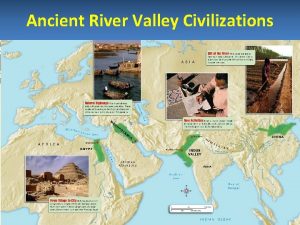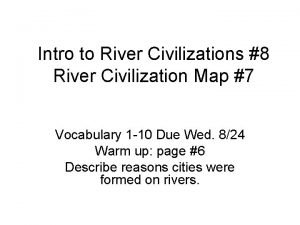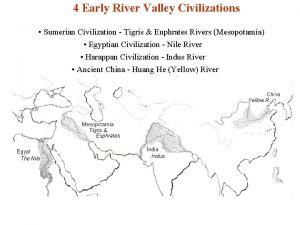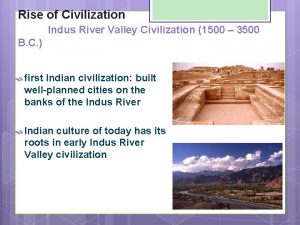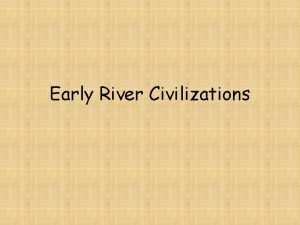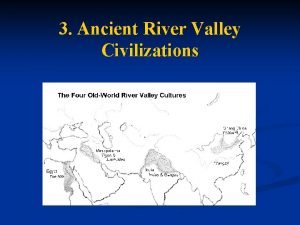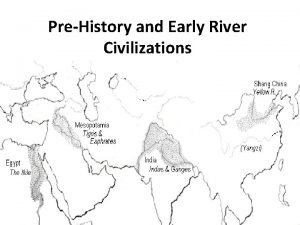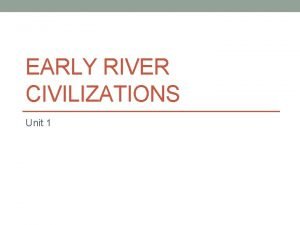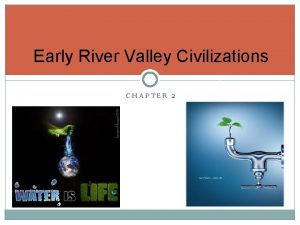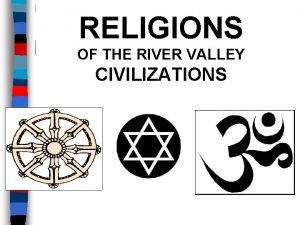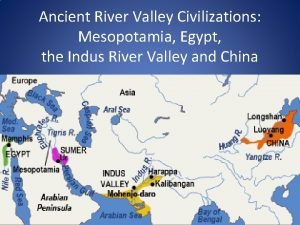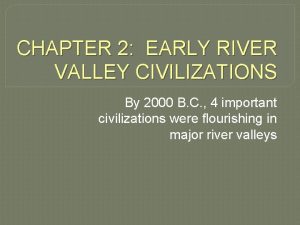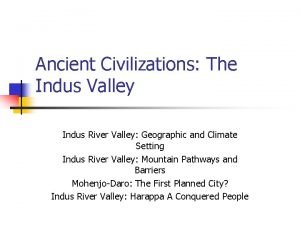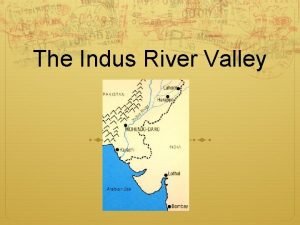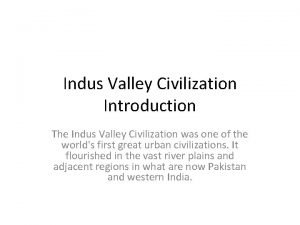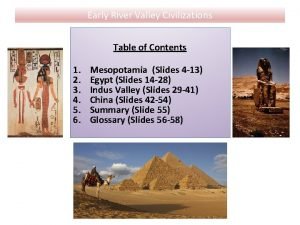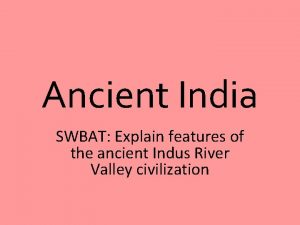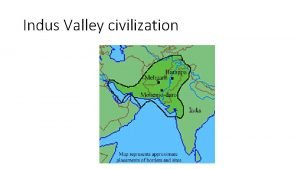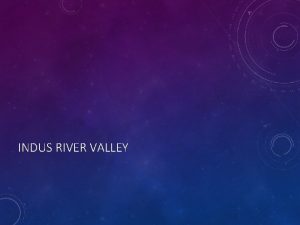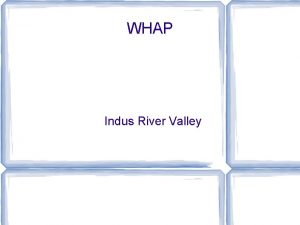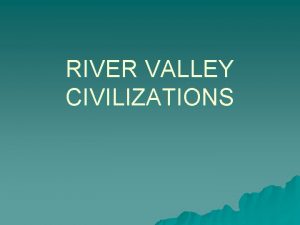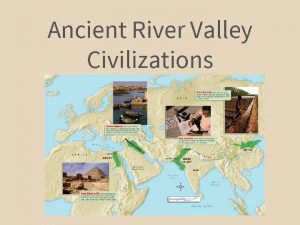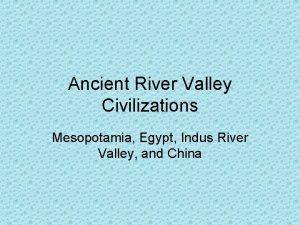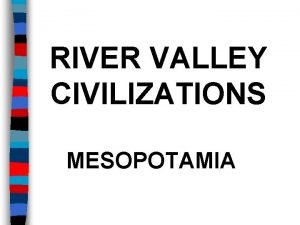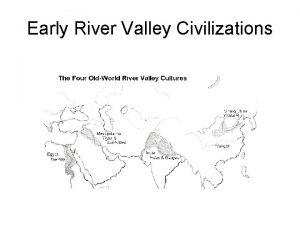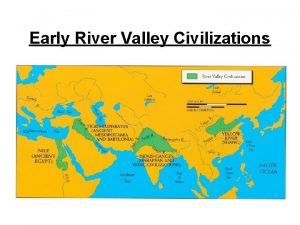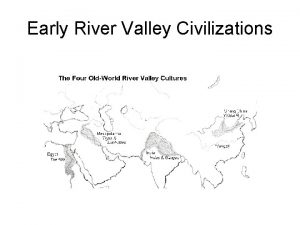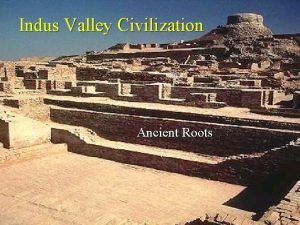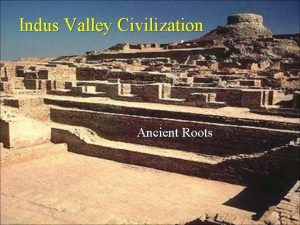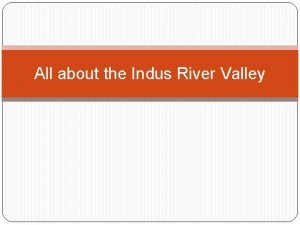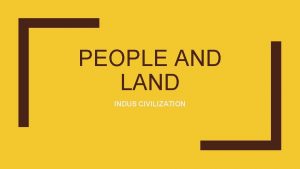Ancient Indus River Valley Civilizations ramblersholidays co uk

Ancient Indus River Valley Civilizations ramblersholidays. co. uk

Ancient Indian Civilizations Big Ideas • Early Indus River Valley Civilizations Supporting Details • Isolated from rest of Asia by mountains and ocean – Himalayas and Hindu Kush – Indian, Bay of Bengal, Arabian Sea • Crops depend on summer monsoon • Rich soil allowed early farmers to grow wheat and other grains, surplus allowed population to grow ramblersholidays. co. uk

Ancient Indian Civilizations Big Ideas • Early Indus River Valley Civilizations Supporting Details • Harappa and Mohenjo-Daro – – Drainage Systems Blocks and streets Citadel Canals • Trade as far as Mesopotamia ramblersholidays. co. uk


Mohenjo-Daro and Harappa Activity

Ancient Indian Civilizations Big Ideas • Aryans Supporting Details • Meaning “Noble or Highborn” • Chariots • Assimilation • Develops in North Indus Valley, spreads East along Ganges ramblersholidays. co. uk

Ancient Indian Civilizations Big Ideas • Aryans Supporting Details • Four Classes (Caste System) – – Brahmans-priests Warriors and Nobles Artisans and Merchants Farmers, Laborers, Servants ramblersholidays. co. uk

Ancient Indian Civilizations Big Ideas • Hinduism Supporting Details • Developed as Aryan culture mixed with native Indian • One of the oldest “living” religions • No single founder, many religious thinkers • Hundreds of gods and goddesses • Do believe in brahaman: one single spiritual power which lives in everything – Brahama (creator), Vishnu (preserver), Shiva (destroyer) – Avatar – representation of a god/goddess in human or animal form ramblersholidays. co. uk

Ancient Indian Civilizations Big Ideas • Hinduism Supporting Details • Reincarnation- rebirth of the soul – Every living thing has a soul – Good behavior rewarded, bad punished in the next incarnation – Perfect life= become one with Brahman and end reincarnation cycle • Dharma- Religious or moral duties of each person. Duties depend on class. • Ahimsa- The Hindu practice of non-violence ramblersholidays. co. uk

Ancient Indian Civilizations Big Ideas • Buddhism Supporting Details • Origin- Siddhartha Guatama – Young Hindu Prince – Grew up in palace with no suffering – When 30 yrs old, traveled outside and saw suffering and death – Gave up wealth and began search to find cause of human suffering – Studied with Hindu philosophers, but not satisfied – Fasted and Meditated for 49 days – Spent the next 45 years traveled over Indus/Ganges Valley – Followers called him the Buddha “Enlightened One” ramblersholidays. co. uk

Ancient Indian Civilizations Big Ideas • Buddhism Supporting Details • Buddha’s Teachings – The Middle Way or Eightfold Path • Nirvana- meaning lasting peace – Achieved if people followed the Middle Way • All people are equal, anyone can achieve Nirvana regardless of class. *** Very Important*** • Buddhism spread throughout India and all of Asia – Missionaries to China – spread then to Korea, Japan, Tibet, Vietnam ramblersholidays. co. uk

Graphic Organizer Hinduism Buddhism

Ancient Indian Civilizations Big Ideas • Mauryan Empire Supporting Details • Chandragupta – Unified the small warring states through military might in 321 B. C. – Empire extended over most of Northern and Central India – Absolute Rule • Huge Army • Wealth from Farming and Trade – Became paranoid – Died as a monk in Southern India ramblersholidays. co. uk

Ancient Indian Civilizations Big Ideas • Mauryan Empire Supporting Details • Chandragupta’s Legacy – – Wealth for all of Empire Irrigation Roads for trading Order and Peace to region ramblersholidays. co. uk

Ancient Indian Civilizations Big Ideas • Mauryan Empire Supporting Details • Asoka – Chand’s grandson – Expanded Empire to include most of the subcontinent – Very involved – Battle of Kalinga 261 B. C. • Battle of Kalinga – Major turning point in Asoka’s life. – 100, 000 Kalinga civilians and 10, 000 Asoka’s army dead • “Your actions have taken from me my father, husband son, now what will I have left to live for? ” – Gave up war and violence – Converted to Buddhism ramblersholidays. co. uk

Ancient Indian Civilizations ramblersholidays. co. uk

Ancient Indian Civilizations “What have I done? If this is a victory, what is defeat then? Is this a victory aor a difeat? Is this justic on inhustice? Is it gallantry or a rout? Is it vallor to kill innocent children and women? Do I do it to widen the empire abd for prosperity or to destroy the other’s kingdom and splendor? One has lost her husband, someone else a father, someone a child, someone an unborn infant… What’s this debris of the corpses? Are these marks of victory or defeat? Are thses vultures, crows, eagles the messengers of death or evil? ” -Asoka after the Battle of Kalinga ramblersholidays. co. uk

Ancient Indian Civilizations Big Ideas • Mauyan Empire Supporting Details • “The New” Asoka – Spread Buddhism through empire and abroad (China, Egypt, Greece) – Wrote laws protecting people and animals • • Improved infrastructure Wells Hospitals Universities – Further united India ramblersholidays. co. uk


http: //www. bbc. co. uk/schools/primaryhistory/indus_valley/
- Slides: 20
